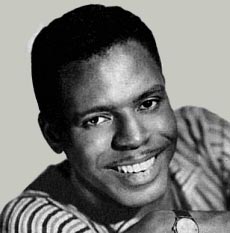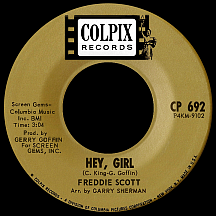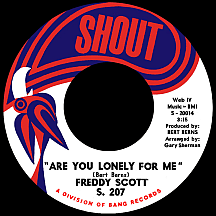FREDDIE SCOTT
Hey, Girl
It always helps to have connections. Sometimes an artist benefits from his or her affiliations, other times best-laid plans go awry, so it's been said. Singer-songwriter Freddie Scott got some breaks, curve balls were thrown, triumphant moments followed, and his career took the inevitable downturn, though not until after he'd realized a lofty goal or two. His drive and ambition placed him in a favorable position at least three times: record company owner Zelma "Zell" Sanders took him under her wing, prolific spousal songwriters Carole King and Gerry Goffin surprised him (and themselves, perhaps) with a major hit some years later, then music impresario Bert Berns delivered on a workable plan to keep his star shining further down the line.
Born into a musically-focused family, the Providence, Rhode Island native grew up with three harmony-loving sisters (one of them his twin) and a mother who accompanied all four siblings on piano, strictly for fun at home. At the age of eleven Freddie began performing with his grandmother, Sally Jones, leader of The Gospel Keys; after World War II ended in 1945, the talented youngster accompanied the spiritual group on a tour of Great Britain. He began studying medicine at the University of Rhode Island immediately after high school and, as a sideline, joined The Swanee Quintet Juniors, a youthful counterpart to the popular Swanee Quartet that recorded for the Nashboro label of Nashville, Tennessee. In 1956, setting his gospel preference aside, he quit college to actively pursue a career in secular music.
While making the rounds of various New York City companies he received positive input from Zell Sanders, one of the era's few female record label owners, who liked "Turn the Lights Down Low," a song he'd written with the hope one of her acts, Johnnie and Joe, might record it. She suggested he do it himself and it ended up on the flip side (with Sanders taking composer credit) of "Running Home," his first effort for the label. The A side received enough local exposure to keep him busy for awhile as a performer, highlighted by a booking at Harlem's Apollo Theater.
Shortly afterwards, Freddie was drafted by the U.S. Army and briefly served in Korea. Soon his vocal talent became apparent and he was transferred to Special Services, performing for troops until his discharge in 1959. During leave time he formed a group called The Chimes (no association with the hitmaking Brooklyn-based act of the same name), recording four sides for the small Arrow label. Ballad "Please Call" and the uptempo flip, "The Letter Came This Morning," were written (and credited this time) to Scott. The second single followed the same pattern, though neither side was penned by Freddie. Later in the year he recorded a solo single, "Tell Them For Me," for the affiliated Bow label. Post-military, he sang on one single for the Enrica label as a member of The Symphonics, the rousing "Come on Honey 'Let's Dance.'"

More than a year passed before a new opportunity came with the Joy record label; "Lost the Right," a ballad more in the pop style than previous releases, received airplay on several major city top 40 stations but failed to reach any national charts. A follow-up on Joy, "When the Wind Changes," had even less luck. He was hired by Aldon Music in New York City and began collaborating with staff writer Helen Miller; their song "The Door is Open," recorded by Tommy Hunt, was a minor chart entry in January 1962. Scott made an impression on Don Kirshner and Al Nevins, who ran Aldon out of the Brill Building, and became friends/competitors with staff songwriters including Howard Greenfield, Carole King and Gerry Goffin. Certain he would catch a break in that environment, he came close to producing some tracks for Erma Franklin, Aretha's sister signed to Epic Records at the time, but was quickly replaced by a more experienced producer at Columbia/Epic, Al Kasha.
King and Goffin supplied that break Scott had been hoping for. "Hey, Girl" was penned with Chuck Jackson in mind and Freddie did the vocal on a demo of it, but Chuck wasn't interested. Freddie then recorded the track with a full studio orchestra and Goffin producing; The Cookies (who'd just scored their first hit, "Chains," with the same writing/producing team) contributed the 'Bye bye baby' backing vocals. The single on Colpix made the national top ten in September 1963 and climbed to number two on the R&B charts. He followed it with a top 50 reworking of Ray Charles' classic '55 hit "I Got a Woman," given a lush romantic flavor in contrast to the rocking original, then reached the charts again in the spring of '64 with another King-Goffin tune, "Where Does Love Go." Drawn to pop music and film themes, prioritizing middle-of-the-road ballads had been Freddie's idea; Columbia Records offered him a contract and placed him with producer Clyde Otis, who knew a thing or two about pop ballads. The label promoted him as "The Million Dollar Baby," but "One Heartache Too Many" and three other failed singles rendered the nickname obsolete.
For Scott, the Brill Building could also be referred to as the Land of Opportunity; it was there the connections were made that defined his career. Bert Berns, who'd known him since he'd joined Aldon, signed Freddie to his new Bang Records operation, where he became the leading act on the label's soul music subsidiary, Shout. In late 1966 he recorded "Are You Lonely For Me," written and produced by Berns and arranged by Gary Sherman (a close friend of Freddie's who'd been involved with every project since "Hey, Girl"). It marked a progression into a more soulful funk-leaning mindset, a direction Berns, on the lookout for an artist similar to Solomon Burke, with whom he'd previously worked, felt would be a good fit for Scott. "Are You Lonely" reached number one R&B in February '67 and returned him to the pop top 40.
While nothing else reached the same level of popularity, Freddie (whose name was sometimes spelled with a "y" on labels) built a fan base, performed for many large crowds and enjoyed chart singles for the next three years, including a remake of Burke's "Cry to Me," "Am I Grooving You" (a Berns-Jeff Barry sequel of sorts to the first Shout disc), Van Morrison's "He Ain't Give You None," Kenny Gamble and Leon Huff's production of "(You) Got What I Need" ("Just a Friend," a variation of the song by rapper Biz Markie, became a top ten hit in 1989) and a moving rendition of Bob Dylan's "I Shall Be Released" on the ABC Probe label in 1970. Continuing to record through the mid-'70s, Freddie Scott stayed busy for many years on the oldies concert ciruit while spending his days writing commercial jingles with longtime collaborator Helen Miller.



